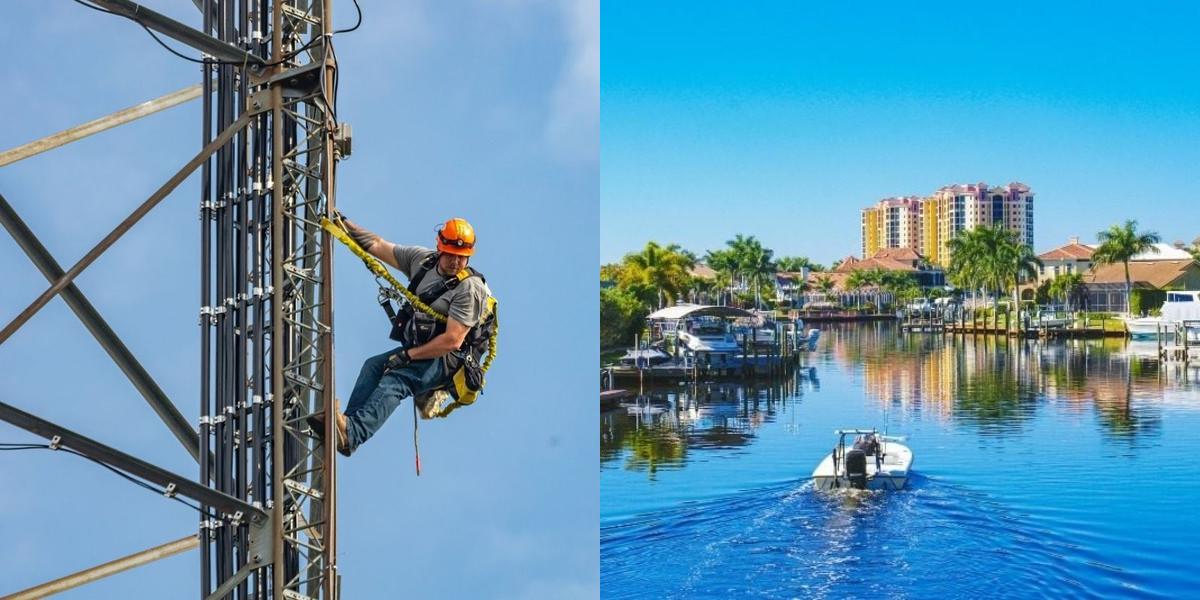How to Become a Tower Technician in Florida (2025)

Tower technicians, also known as tower climbers or telecom tower technicians, are professionals who specialize in the installation, maintenance, and repair of communication towers and equipment. They play a crucial role in ensuring the smooth and efficient operation of wireless networks.
Step 2: Network with industry professionals
Networking is a powerful tool when it comes to finding job opportunities. Attend industry conferences, workshops, or trade shows to connect with professionals in the field. Join online forums or social media groups dedicated to Tower Technicians to engage with others in the industry.
Building relationships with industry professionals can lead to valuable connections and job opportunities. Many job openings are filled through word-of-mouth referrals, so it is important to make a positive impression and stay connected with others in the industry.
Step 3: Search for job openings
There are several ways to search for Tower Technician job openings. Online job boards, such as Indeed or LinkedIn, often have listings for these positions. Additionally, you can reach out to telecommunication companies, tower construction firms, or wireless infrastructure companies directly to inquire about any available positions.
When applying for jobs, tailor your resume and cover letter to highlight the specific skills and experience required for each position. This will show potential employers that you are a qualified candidate for the job.
Step 4: Prepare for interviews
Once you have submitted your application and have been invited for an interview, it is important to prepare thoroughly. Research the company and familiarize yourself with their operations, projects, and values. Be prepared to answer questions about your experience, skills, and how you would handle various scenarios on the job.
Additionally, practice your elevator pitch – a brief summary of your qualifications and why you are the best candidate for the job. This will help you confidently communicate your value to potential employers during the interview.
Step 5: Continue learning and growing
The field of telecommunications is constantly evolving, and it is important to stay updated on the latest developments and technologies. Continuing education and professional development courses can help you expand your knowledge and skills, making you more marketable to potential employers.
Consider joining professional organizations such as NATE or attending industry conferences and workshops to stay connected with industry trends and advancements.
Career Paths and Opportunities after Becoming a Tower Technician
Becoming a certified Tower Technician opens up a wide range of career paths and opportunities. Here are a few potential career paths you can explore:
1. Tower Climber Supervisor
With experience and additional training, you can progress to a supervisory role as a Tower Climber Supervisor. In this position, you will be responsible for overseeing a team of Tower Technicians, ensuring that projects are completed safely and efficiently. This role requires strong leadership and communication skills, as well as a deep understanding of tower climbing safety protocols.
2. Tower Inspector
As a Tower Inspector, your role will be to assess the condition and safety of existing communication towers. This involves conducting inspections, identifying structural deficiencies, and recommending repairs or maintenance. Tower Inspectors play a crucial role in ensuring the integrity and safety of communication infrastructure.
3. Tower Project Manager
Tower Project Managers are responsible for overseeing the planning, coordination, and execution of tower construction and installation projects. In this role, you will work closely with clients, engineers, and Tower Technicians to ensure that projects are completed on time, within budget, and in compliance with industry standards.
4. Tower Technician Trainer
With experience and a passion for teaching, you may choose to become a Tower Technician Trainer. In this role, you will be responsible for developing and delivering training programs to aspiring Tower Technicians. This involves creating curriculum, conducting training sessions, and assessing the performance of trainees.
5. Self-Employment
Many experienced Tower Technicians choose to start their own businesses and work as independent contractors. This allows them to have more control over their work schedule, projects, and income. However, self-employment also comes with its own set of challenges, such as finding clients and managing business operations.
These are just a few examples of the career paths and opportunities available to certified Tower Technicians. The telecommunications industry is constantly evolving, and there is always a need for skilled professionals in this field.
Final Thoughts
Becoming a Tower Technician can be a rewarding career choice for those who enjoy working with their hands, have a strong attention to detail, and are comfortable working at heights. By following the steps outlined in this article, you can obtain your Tower Technician certification and increase your chances of finding a job in this field.
Remember to continuously update your skills and knowledge to stay competitive in the industry. Networking with professionals in the field and staying connected with industry trends can also open up new opportunities for career growth.
Whether you choose to advance to a supervisory role, become a Tower Inspector, or start your own business, the field of tower climbing offers a diverse range of career paths to explore.
Dreambound has put together numerous guides to help you navigate the certification process in this field, tailored for various cities. For insights into the process or requirements in other states, see some of our additional guides below.
- Tower Tech classes near me in Baltimore
- Tower Tech classes near me in Greensboro
- Tower Tech classes near me in Nashville
- Tower Tech classes near me in Richmond
- Tower Tech classes near me in Virginia Beach
Thinking about a potential career transition? Dreambound offers detailed guides to help you with making an informed decision. Dive in below:

Joanna Paragas is part of the Growth team at Dreambound. Her primary role involves creating various automation to streamline workflows and make tasks more efficient for the entire team. Beyond her professional endeavors, Joanna enjoys spending her free time playing with her dogs and enhancing her knowledge by enrolling in online courses.



